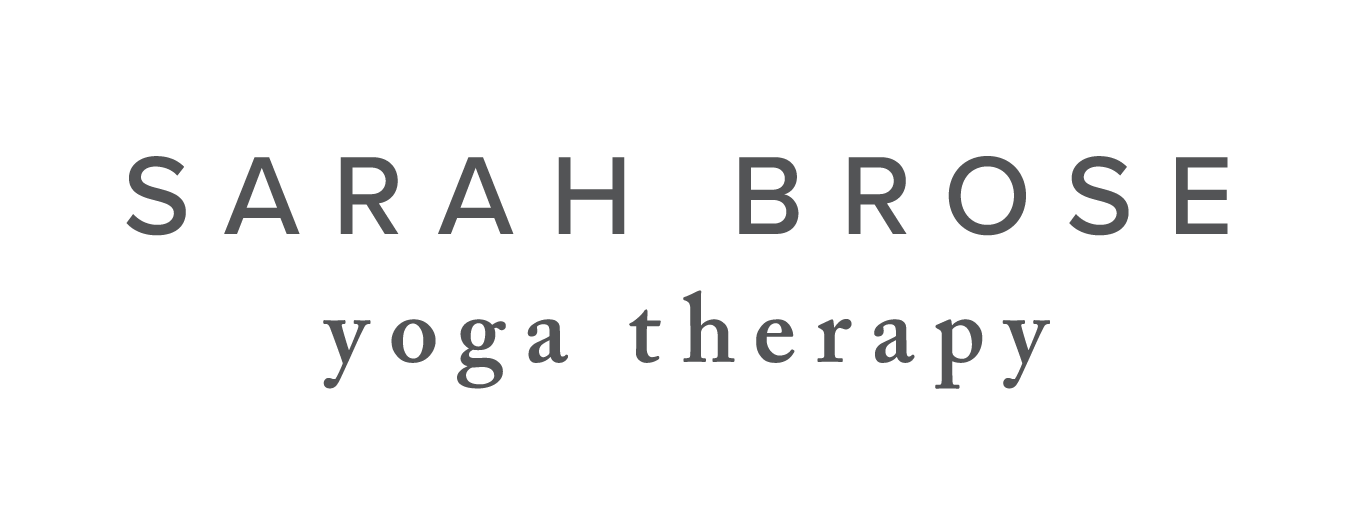Frequently Asked Questions
+ Is Yoga Therapy right for me? What are the benefits?
Yoga Therapy can be aimed at the maintenance or enhancement of existing health, the prevention of future ailments, the management of manifesting symptoms and in some cases, the support in healing the underlying root cause of disease. Since the practice of Yoga Therapy is modified to suit the individual, there are no requirements of fitness, age or health in order to begin. What is required is that an individual is open and willing to become an active participant in their healing process.
It is important to note that Yoga Therapy is taught as a complimentary system of health, not an alternative one. It supports and works in conjunction with your normal medical treatments. Medically speaking, the practice works to support the healthy functioning of the parasympathetic nervous system, which in turn supports homeostasis and healing.
In general, the benefits of Yoga Therapy may be helpful for anyone living with:
- Experience of chronic pain, tension, mis-alignments (i.e. scoliosis, sciatica, arthritis, joint replacement)
- Mental or emotional issues (i.e. addiction, trauma, depression, anxiety, grief)
- Management of auto-immune, digestive or movement disorders (i.e. IBS, IBD, cancer, celiac, MS, Parkinson’s)
- Unbalanced hormones affecting quality of life (i.e. menstrual irregularity, PMS, infertility, menopause)
- Desire to live a more authentic and joyful life
- Desire to become more self-reliant in your healing journey
+ How is Yoga Therapy unique from other alternative or complimentary healing modalities?
One of the unique advantages of a system like yoga is that it views the human system as a holistic entity that is made up different dimensions (physical body, physiological body, psychological body, underlying personality, underlying Self) that are mutually dependent on and mutually influence one another. This makes the healing process very comprehensive and extremely specific to the individual.
Another distinct advantage of Yoga Therapy is that it is a self-empowering practice. The Yoga Therapist’s role is that of a supportive guide; while the Therapist creates a customized program for the individual, it is the student who is then responsible for actively putting these tools into practice. Rather than being a passive recipient of treatment, the student is actively engaged in the path to well-being. Thus, healing comes from within the student, rather than being prescribed from the outside.
+ How is Yoga Therapy different than a Therapeutic Group Class?
Yoga Therapy is offered on a one-on-one basis and is designed to meet a specific need or health condition of an individual. After an appropriate intake and assessment, Sarah will work with individuals to identify specific symptoms to address and establish appropriate goals and methods for addressing their symptoms. Each student will leave each session with a highly customized practice to apply regularly at home.
Group classes are for personal maintenance, self-education, general well-being and community connection. While it is always Sarah’s intention to honour each student’s abilities and needs, group classes, by nature, work at a “common” level as they need to address a broader range of criteria to keep everyone safe.
Both approaches share an understanding of the human being as an integrated body-mind system, which can function optimally only when there is a state of dynamic balance. Thus, Yoga Therapy and Therapeutic Group Classes will always place a unique focus on function rather than form. In other words, modifications for each technique will be offered in order to suit the needs and abilities of each student so to ensure he or she receives the desired therapeutic effect.
+ How many Yoga Therapy sessions do I need?
Yoga Therapy is rooted in an ancient yoga and ayurveda tradition of long-term therapeutic relationship between teacher and student. While each yoga therapy experience is unique to an individual, in general, yoga therapy is offered once a week for 1-3 week period, followed by biweekly and then monthly sessions. Eventually, yoga therapy sessions are booked on an “as needed” basis. As it is in our individual nature to change, it is important to continue updating your personal practice so it continues to support you.
+ I have a terminal or chronic illness. How can Yoga Therapy help?
Yoga Therapy makes a distinction between healing and curing. While a Yoga Therapist is trained to investigate the underlying root cause of prevailing symptoms, this model does not equate healing with the absence of disease. Instead, healing involves a highly subjective and individual feeling of inner peace and wholeness, an experience one may experience with or without disease symptoms.
